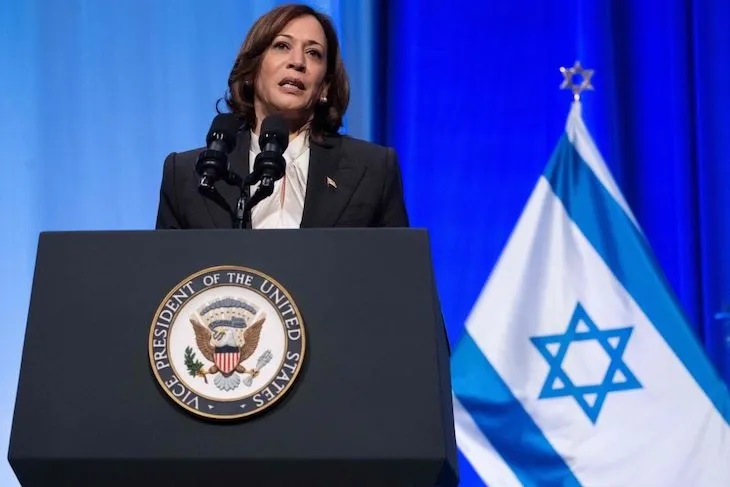In the two days since Joe Biden dropped his re-election bid and endorsed vice president Kamala Harris as the Democratic Party nominee, much attention has been devoted to the mechanics of Biden’s decision, which close advisers or family members may have convinced him to pull out and how the entire episode will shake up the race. But with Harris the strong favorite to become the Democratic’s presidential nominee, it’s worth asking what president Harris could mean for other countries, not least the United States’s allies — and enemies.
The VP is tougher on Israel than Biden for the way it’s prosecuting its war on Hamas
Does Harris have a foreign policy agenda, let alone a foreign policy philosophy? It’s a difficult question to answer, because Harris is in many ways the opposite of Joe Biden on the international stage. Biden has been around for a half-century, has a huge rolodex of foreign leaders on his desk and fancies himself an international relations aficionado. Harris, meanwhile, is a relative newcomer on the national stage. She served one six-year term in the Senate before running for president herself in the 2020 cycle (where she lost) and joining the Biden ticket. Her work in the Senate focused on criminal justice issues given her role on the Senate Judiciary Committee. Foreign policy or national security played only a minor role. As vice president, she was tasked with finding a way to decrease illegal migration from Central America to the US. And as a top cabinet member, Harris was privy to all the closely-held national security conversations; she was reportedly the last person in the room before Biden decided to withdraw US troops from Afghanistan.
For the most part, foreign policy hasn’t taken up much of her time. Even so, there are nuggets of information embedded in her voting record and policy speeches that offer a few clues about where she stands on certain issues.
Broadly speaking, Harris can’t be considered a liberal internationalist in the mold of Bill Clinton, Madeleine Albright and Samantha Power. She isn’t a neoconservative like George W. Bush or a hard-power primacist like Dick Cheney. Nor can she be called a realist like Brent Scowcroft or Henry Kissinger.
Harris, frankly, is hard to pigeon-hole. Where she stands depends on which region of the world we’re talking about.
Like her boss, Biden, Harris isn’t all that enthusiastic about bringing the US deeper into the Middle East and views the use of US military force warily. In 2018, after Trump bombed Syrian military facilities in retaliation for the Syrian government attacking civilians with chemical weapons, Harris questioned what “legal rationale” the White House employed to justify US action.
A year later, when Trump tweeted that US troops would be withdrawn from Syria (in the end, they weren’t), Harris criticized Trump’s decision-making style without necessarily opposing his call to pull out. She was a vocal supporter of the Iran nuclear deal that temporarily capped Tehran’s enrichment work in exchange for US sanctions relief; argued that Trump’s killing of Iranian General Qassem Soleimani in 2020 risked provoking another war in the Middle East; and she sponsored legislation days after Soleimani’s assassination that prohibited US military force against Iran without congressional approval.
On the war in Gaza, Harris has been out front on the urgent need for a ceasefire between Israel and Hamas even before Biden formally floated a draft agreement in May. Rhetorically at least, the VP is tougher on Israel than Biden is for the way it’s prosecuting its war against Hamas. While she has been careful not to stray from Biden’s policy of supporting Israel’s right to strike Hamas militarily, there’s no question that the humanitarian calamity inside Gaza has had deep impressions on her. During remarks this March, Harris was blunt: “People in Gaza are starving. The conditions are inhumane and our common humanity compels us to act.”
Harris even suggested that the US wasn’t ruling out consequences if Israeli prime minister Benjamin Netanyahu ordered a full-scale invasion of Rafah, which was crammed with refugees.
On Ukraine, Harris is a hawk. Her views are identical to Biden’s. She has met with Ukrainian president Volodymyr Zelensky multiple times, and in each encounter reiterated Washington’s full military, economic and diplomatic backing against Russia. If she talks about the prospects of a negotiated settlement to the war, Harris does so in a way that basically rules out a diplomatic process to that end: only Ukraine’s maximalist terms and Zelensky’s so-called “just peace” are acceptable. Of course, Russian leader Vladimir Putin’s incentive to cooperate in such a scheme are virtually nonexistent.
On China, Harris is conventional. During international conferences and foreign trips to Asian capitals, the vice president reiterates the standard line that could come from any US policymaker these days: China is a revisionist power seeking to dominate its smaller neighbors, is violating the international rules-based order and is deliberately making Washington’s goal of a free and open Indo-Pacific harder to accomplish. She blasted China’s “bullying” behavior in the South China Sea and reinforced that the US will support Taiwan’s defense needs. China is likely to view a hypothetical president Harris largely the same way it views a hypothetical president Trump: as a loss either way.
Anyone looking for a Kamala Harris foreign policy doctrine should stop wasting their time. She simply hasn’t been immersed in the issues long enough to have one.
This article was originally published on The Spectator’s UK website.


























Leave a Reply